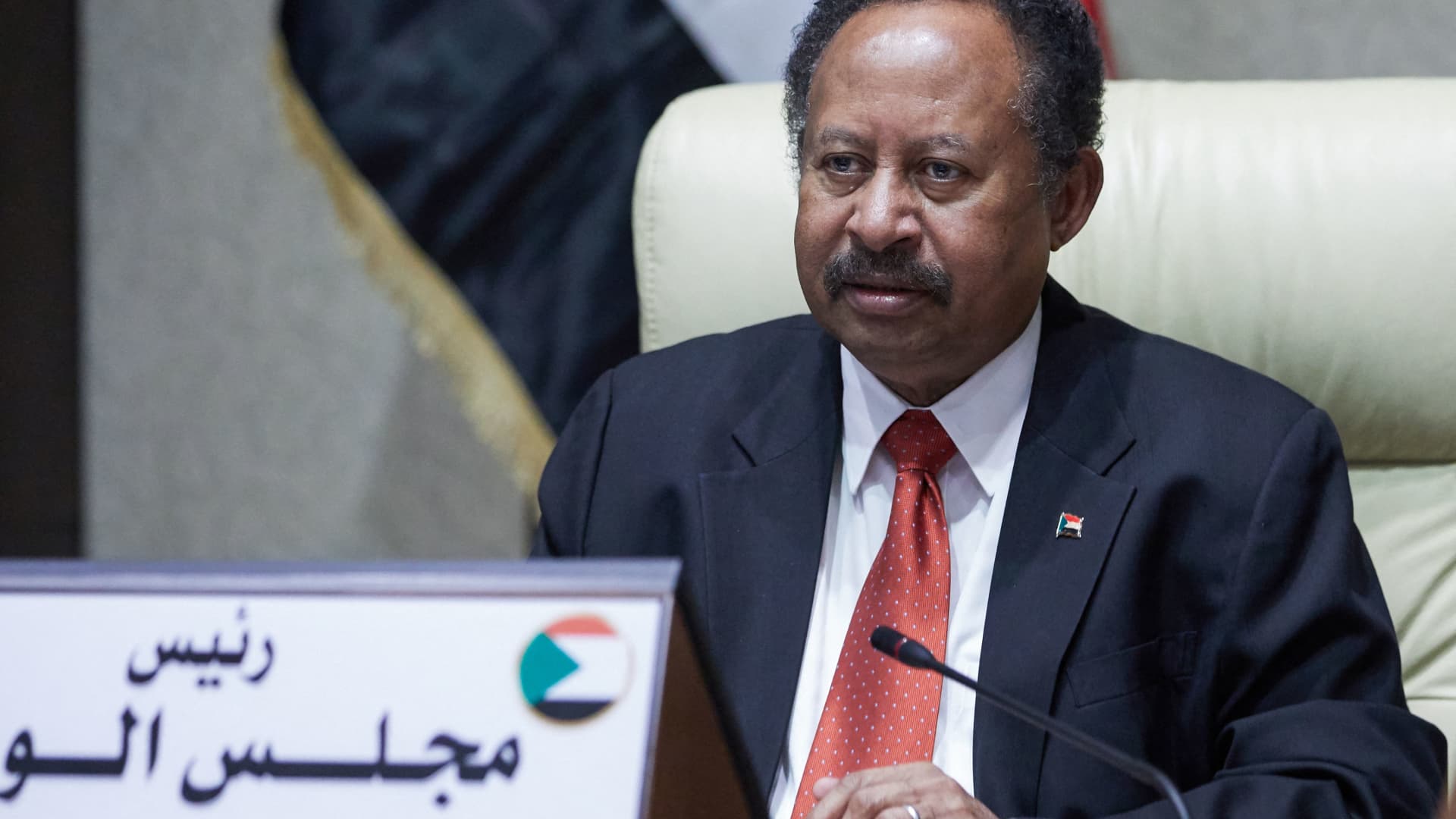
A Sudanese protester draped with the national flag flashes the victory sign next to burning tyres during a demonstration in the capital Khartoum, on October 25, 2021, to denounce overnight detentions by the army of members of Sudan’s government.
- The scale and duration of the civilian resistance appears to have caught the armed forces by surprise, placing strain on relations within the military infrastructure.
- Experts are now anticipating that coup leader General Abdel Fattah al-Burhan may have to settle for a power sharing agreement with the civilian portion of the transitional government.
Sudan's attempted military coup looks increasingly frail as tens of thousands of civilians continue to protest the ousting of Prime Minister Abdalla Hamdok.
The demonstrations in the streets have been met with deadly force, and at least 12 people have been killed, according to various media reports.
However, the scale and duration of the civilian resistance appears to have caught the armed forces by surprise, placing strain on relations within the military infrastructure.
Get top local stories in DFW delivered to you every morning. Sign up for NBC DFW's News Headlines newsletter.
As well as mass demonstrations in major cities, roadblocks have been set up by civilians across Sudan, intended to keep security forces out of neighborhoods and signify defiance in the face of the military's seizure of power in Khartoum on Oct. 25.
Experts are now anticipating that coup leader General Abdel-Fattah Burhan may have to settle for a power-sharing agreement with the civilian portion of the transitional government, but not before further violence.
Violence to escalate
Money Report
In a statement published on the official Facebook page of the country's information ministry on Monday, Hamdok "insisted on the legitimacy of his government and transnational institutions," and argued that his reinstatement could help bring a solution to the country's instability.
The U.S. and the World Bank swiftly suspended aid disbursements to Sudan following the coup, while foreign leaders called for the military to release Hamdok and other detained officials. Robert Besseling, CEO of political risk consultancy Pangea-Risk, said in a research note Monday that France may also retract its offer of a bridge loan to settle Sudan's huge arrears.
"The instability may disturb oil exports from neighboring South Sudan and will have repercussions for the ongoing civil war in Ethiopia, as well as other regional conflicts and broader geopolitics," Besseling said.
The civilian-military transitional government had been in place since April 2019, following the popular overthrow of long-reigning dictator Omar al-Bashir.
The military was due to transfer state control to its civilian partners in November, with a view to scheduling elections and a complete transition to democracy in 2023. However, this chipped away at relations between the two components of the interim government.
"Because of this resistance, and the West's backing for Mr. Hamdok and his civilian comrades, we think Mr. Burhan will have to agree to share power," said Zaynab Mohamed, political analyst at Oxford Economics Africa.
"Tensions in the political environment will remain high in coming months as stakeholders try to negotiate a new agreement, and we expect deadly violence against anti-coup protesters to continue."
Ed Hobey-Hamsher, senior Africa analyst at risk intelligence company Verisk Maplecroft, said factions within the military had been caught off-guard by the scale of the revolt, leading to internal rivalries and Burhan looking "increasingly isolated."
"We expect that the civilian protests will continue to grow in numbers and organisation, exacerbating instability in Khartoum and Port Sudan and straining the internal cohesion of the military," Hobey-Hamsher added.
Power-sharing possibilities
Various news outlets have reported that negotiations between the army and politicians over a power-sharing deal are underway in the capital, signifying a potential reversal of the coup.
In a video from Khartoum on Sunday, U.N. envoy Volker Perthes told reporters that a proposal had been presented to all sides, and voiced hope that a deal will be struck in the coming days.
Reports have suggested that Hamdok may be given full executive powers and for him to appoint a cabinet of experts, along with a three-member honorary transitional council to replace the 14-member military-civilian Sovereign Council, of which Burhan was the chair.
The military could lead a security and defense council and a Parliament would be established to represent political parties, the military and various rebel groups, unconfirmed reports have said.

However, Hobey-Hamsher suggested that the legacy of distrust would render the success of future power-sharing institutions "extremely unlikely," with any arrangement this week likely to be "volatile, short-lived and not conducive to the organisation of credible elections."
Oxford Economics Africa's Mohamed also noted that Burhan's power grab was an attempt to preserve the military's power and economic privileges.
"Senior military officials benefit from Sudan's military-industrial complex, which is dominated by a network of companies controlled by the army in key industries such as gold, rubber, meat exports, flour, and sesame," she said.
"Had Mr. Burhan handed over his chairmanship of the Sovereign Council to a civilian in November, as required by the peace deal, this entire economic system would have been under threat."






